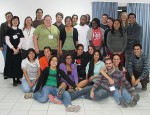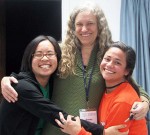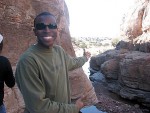Never before has the conversation been clearer on what the culture of ecology actually means and the role of culture in the future of our science. That was the conclusion of participants at the 4th annual SEEDS Leadership Meeting held Feb. 26 to March 1 at the Sevilleta LTER in New Mexico.
SEEDS -- Strategies for Ecology Education, Diversity and Sustainability -- is an education program of the Ecological Society of America (ESA) whose mission is to diversify and advance the profession of ecology through opportunities that stimulate and nurture the interest of underrepresented students.
The theme of the meeting was "The Culture and Future of Ecology." In true SEEDS spirit, participants shared the stories behind their ecology pursuits, and the clear diversity among these stories wove a strong web of support that encouraged rich thinking. The meeting was a great success, with 23 SEEDS student and alumni leaders participating in all aspects of the SEEDS program. Workshops, discussions, breakout groups, and a field trip were led by the students themselves, with full participation and support of collaborators from the National Center for Ecological Analysis and Synthesis (NCEAS), National Ecological Observatory Network (NEON), Long Term Ecological Research (LTER) Network, and ESA President Sunny Power.
As the meeting progressed, it provided various opportunities for the leadership torch to be passed and shared among SEEDS participants, local, and national collaborators. We began with an introduction to New Mexico and the Sevilleta LTER by Jolene Trujillo (Arizona State University-ASU), Will Pockman (University of New Mexico-UNM), and Jennifer Johnson (UNM).
Excellent and engaging workshops were given by SEEDS students and alumni, including:
- "The Millennium Ecosystem Assessment: what it is and why every ecologist should know about it" by Christina Wong (ASU) and Jolene Trujillo
- "Combining ecological research and community outreach" by Ana Elisa Perez (University of Puerto Rico, Rio Piedras)
- Raynelle Rino (San Francisco State University
- a virtual workshop on "Opportunities that take you far from home" by Andrea Rivera (University of Plymouth/University of Cadiz) and Jorge Ramos (University of Washington)
In addition, several ESA members attended the meeting and shared their ideas about the culture and future of ecology. Margaret Connors and Carlos Melian of NCEAS illuminated the complexity of the concept of synthesis, and discussed opportunities available through NCEAS to connect researchers who tackle large-scale ecological questions. Debra Peters (Jornada LTER) discussed the role of LTER and NEON in the future of the ecology profession. ESA President Sunny Power of Cornell University participated in our SEEDS leadership forum, shared her personal insights on leadership, and even went on a sunset hike with SEEDS students.
The meeting was rounded out with a career panel discussion with Sevilleta scientists Robert Sinsabaugh and Andrea Porras-Alfaro, NCEAS post-doc Carlos Melian, and SEEDS Advisory Board member Christina Wong. An afternoon field trip to Cibola Springs to tour the field research site of SEEDS fellow Jarrod Blue (University of Tennessee, Knoxville) helped focus our thoughts on the high desert ecosystem hosting our meeting.
A big contributor to the success of the meeting, in addition to the student-generated itinerary, was the fact that every single person shared their thoughts and ideas during our discussions. This conscious effort was made by staff and students alike, and the assurance that the ideas of all were welcome encouraged tremendous participation in resulting discussions. The SEEDS students are preparing a written summary of the proceedings of the meeting, which we hope to publish in the July issue of the ESA Bulletin.
Melissa J. Armstrong is ESA's Diversity Programs Manager

 Enlarge this image
Enlarge this image

